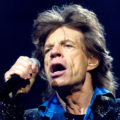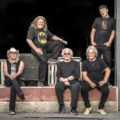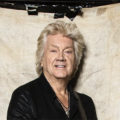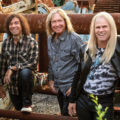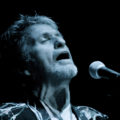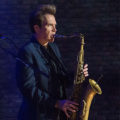Former Traffic, Fleetwood Mac member Dave Mason “Feelin’ Alright” about City Winery stops
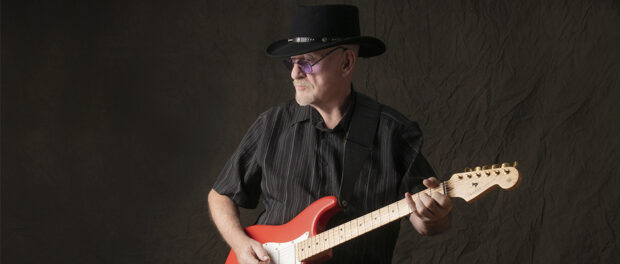 Photo provided by Mad Ink PR
Photo provided by Mad Ink PR
Few musicians have managed to be part of one Rock and Roll Hall of Fame inducted supergroup, let alone land in a second with an enormous solo career in between.
But Dave Mason isn’t like most artists, who besides being a virtuoso guitarist in general, can also switch between heavy, bluesy, psychedelic and soft rock on the dime, sounding equally distinctive in each category.
So whether it’s co-founding “Dear Mr. Fantasy” and “Feelin’ Alright?” creators Traffic in the late 1960s, “Time” in latter day Fleetwood Mac or belting out his own “We Just Disagree,” there’s no mistaking the man behind the axe or mic.
In other words, Mason has a massive body of work to choose from when he stops by the City Winery for two sure-to-be sold out shows on Monday, February 20 and Tuesday, February 21.
During a casual phone call with Chicago Concert Reviews, he weighed in on that illustrious history, recording “Alone Together, Again” after the original master tapes caught fire, plus a preview of an upcoming memoir, “Only You Know And I Know.”
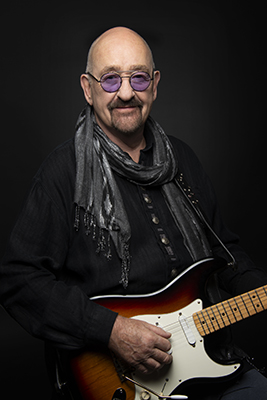
Photo provided by Mad Ink PR
Dave Mason: Well, a show (laughs). No smoke bombs, no dancing girls, just straight up music. It’s got Dave Mason songs, and we do some Traffic, and that’s pretty much the make-up of the show.
Can you recall any performances in Chicago?
Mason: I’ve played a number of times. The biggest show I did was probably Grant Park, probably back in the ‘70s. There’s different ones. Some of them I don’t remember really. There might be some venues that are not there anymore, frankly. In the recent past, most of it has been at the City Winery.
What else comes to mind about visiting the Windy City in general?
Mason: There’s a lot of stuff, a lot of great restaurants, a lot of great museums. It’s been a great city over the years for me and good friends.
Going back to how it all started, how would you describe the early days of Traffic?
Mason: There’s finally a book coming out in May called “Only You Know And I Know” that really addresses all that stuff and what happened with it. But basically, Jim Capaldi and I had bands together when we were kids. [We] met up with [Steve] Winwood and that, just after hanging out, evolved into Traffic. [That’s] pretty much how it happened.
What was it like once the band started gaining acclaim and fame?
Mason: Sometimes it means you can get a better table when you go to a restaurant (laughs), but, you know, you get popular. That’s what you’re hoping will happen, so it’s not really a big surprise. But that’s kind of what you’re working towards, obviously, a degree of success.
What do you think separated Traffic from the rest of the pack during that period?
Mason: We were probably one of the original alternate [or alternative] bands, I would say at this point looking back. We had a lot of very diverse musical tastes in there, probably one of the early alternate and early jam bands.
The albums you made together are considered classics and have been reissued in various formats, including vinyl. How does it feel to see them recirculating?
Mason: Oh God, well, they’ve rehashed that stuff a number of times. I mean, the fact that the music has lasted that long is great. A lot of it holds up. Some of the very early stuff sounds dated, but other things don’t. It’s just great that it’s held up and it’s part of whatever record label’s catalogue. The labels are going to milk it for as much as they can, so that’s the other part of it.
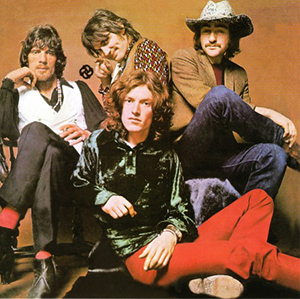 There isn’t a day that goes by without the radio playing someone’s version of “Feelin’ Alright?” Your thoughts?
There isn’t a day that goes by without the radio playing someone’s version of “Feelin’ Alright?” Your thoughts?
Mason: There’s been 50 major acts that have covered it. Every bar band and garage band has probably played it at some point. The song just keeps going, the Energizer Bunny song.
What does it mean to you at this point?
Mason: It’s amazing that it’s lasted and been covered as many times.
Any quintessential versions besides your own in Traffic?
Mason: Well, [Joe] Cocker’s version is what really created all the other versions, for sure.
Can you briefly recap the creative differences that caused you to leave the band?
Mason: That’s all in the book, so I’m really not going to talk too much about that, otherwise there’s no point in the book.
What was the writing process like for you? Did you keep any notes over the years or was it all recreated from memory?
Mason: No, no (laughs). Thank God I had [co-writer] Chris Epting to help with all of the details, times and places. Otherwise, most of it would probably have never gotten done. But it’s all written. The writing of it’s pretty much, in the most part, all in the way I would write it, but he did a lot of the research for me.
What do you hope people will take away from the book?
Mason: I really don’t know. It’s the same thing as the songs. Everybody has their own interpretation of what something is. Someone asked me about playing and stuff. “You do it for other people?” And I said, “no, I do this for myself. If you like it, that’s great, but otherwise, I do it for me.” But I put this all out there cause the fans, for years at times, [were] saying, “you need to write a book.” So eventually, Chris Epting came forward about five years ago at a show and said, “I really would like to do this with you,” and that’s pretty much how it started. It’s just as much of my story as I could put in there, my life, my music, whatever, so what people are going to take away from it, I have no idea (laughs). Everyone will have their own version, believe me (laughs).
Starting around the time of Traffic and throughout your whole career, you went on to do session work with practically everyone.
Mason: I really didn’t do session work. I just happened to be at the right place at the right time. I really wasn’t there as a session guy.
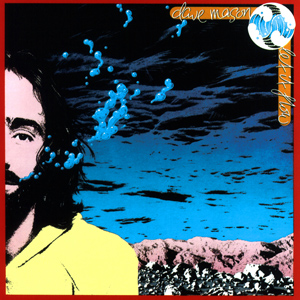 Or rather, you knew all of these artists personally. Who are a few that stand out?
Or rather, you knew all of these artists personally. Who are a few that stand out?
Mason: They all do. They all have relevance. Because I’m a guitar player, [Jimi] Hendrix [and the “Electric Ladyland” album] probably would be the first cause that’s really what I am. I guess that would take predominance for the most part.
You also worked with The Rolling Stones and some Beatles, which very few people can probably say as well.
Mason: I did. I played [shehnai and bass drum] on [The Rolling Stones’] “Street Fighting Man” and played guitar on [Wings & Paul McCartney’s] “Listen To What The Man Said.”
To those on the outside, these guys look larger than life. What’s it like being in the studio with them?
Mason: They were great musicians. They were very successful, very original and outstanding in their own right. To be able to work for them was great. I got very lucky, I guess for the most part, in being able to be pretty much at the right place at the right time.
What were your visions when you first went solo?
Mason: Hoping I could get a hit record (laughs).
How about stylistically?
Mason: Stylistically is exactly what was on “Alone Together,” which was basically a combination of acoustic and electric guitar with some keyboards. Musically, that was the general idea, not much different than what we were doing with Traffic. I mean a lot of those songs, had things not happened the way they did, would’ve probably been on the third Traffic album.
What led you to cut “We Just Disagree”? How did it attract another new audience for you?
Mason: I don’t know if it attracted a new audience or not. It was just a good song written by [guitarist/songwriter] Jim Krueger, who was with me for about 18 years. It was just a really good song with a timeless theme.
Even Michael Jackson joined you on “Save Me.” How did that come about?
Mason: I don’t know which album he was doing, but he was on a break [at the neighboring studio]. I needed somebody to sing a high part and I asked him if he would mind doing it. “Yeah, sure man. No problem.” He came in and sang on the song. In fact, he did more than I asked him to do, and was just very generous, and very nice about it, and that was basically it. After he’d done it, off he went back to working on his own album in the other studio. It was pretty brief.
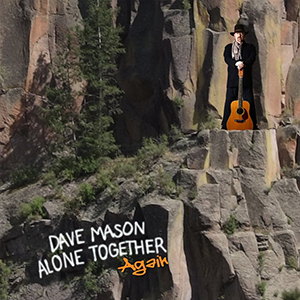 Can you give us a rundown of your latest album, “Alone Together, Again.”
Can you give us a rundown of your latest album, “Alone Together, Again.”
Mason: I did that mostly because the original masters all got lost in the fire in Universal. So I thought I’d just recut the whole thing, plus it was way past re-recording restrictions, so I owned the masters finally.
How do you ever get over or even handle that fire destroying those tapes?
Mason: Um (sighs), to be honest with you, it was like, “oh, okay” (laughs) cause I’m just one of a bunch of artists that lost the original masters. [They] were gone, but I’m sure they had them all digitized, so it wasn’t like they were really gone. It really wasn’t that big of a loss for me. I mean, it was gone anyway. I didn’t own it. I didn’t own the original masters. They’d already been lost, so to speak (laughs), as far as I was concerned.
What is your opinion of analogue versus digital and the whole switch over?
Mason: It doesn’t really, to me, make much difference. It’s about the song. The only big difference is everything has been digitized and everybody is streaming everything, so we’ve lost all our royalties and revenue streams have disappeared. We’re just basically stuck with playing live. That’s how we make our money and make a living, so that’s the big difference.
Will you continue recording or is live going to be your focus?
Mason: Live’s the focus, but I have stuff that I do. We take [new projects] to the venues for people to buy if they want at the concerts…The “Alone Together, Again” vinyl is what we pretty much have on the road and there’s some odds and ends…I am putting together a little blues-flavored album. What will happen with it, I have no idea (laughs), but that’s just for fun. I’m doing it and whatever happens, happens. I’m not making it with the intention or the belief it will do anything substantial.
In between all of this, you also were a member of Fleetwood Mac for a bit. What attracted you to join?
Mason: Mick [Fleetwood] was thinking about putting another [line-up of] Fleetwood Mac back together [in the mid-1990s], and called me, and asked me if I’d be interested in being part of it. I was at a point where I had the time and I really had nothing planned. It just seemed like a good idea at the time, so that’s really how it happened.
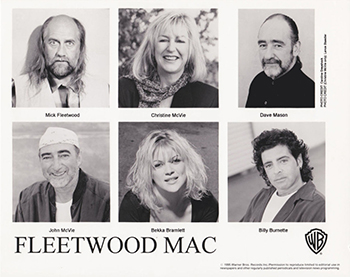 How do you view that experience?
How do you view that experience?
Mason: I was with a version of Fleetwood Mac for a couple of years. We did an album called “Time” that really didn’t get much promotion, so I don’t think a lot of people were really aware of it. We played, did a lot of touring, but the only two original members were Mick and John McVie. Even though Christine [McVie] did the album, she didn’t go on the road, so it sort of became like a Fleetwood Mac cover band.
What was it like working with those guys and Christine in the studio?
Mason: I never did work on any of her stuff. She had somebody else play with her for that…Mick I’ve known for a long time and that was just working on an album, picking whatever material we were going to do, pretty much similar to really doing any recording process. It wasn’t much different.
Despite its lack of promotion, any additional opinions of “Time”?
Mason: It was a good album. There’s some cool stuff on there. To be honest, I haven’t listened to it in a long time, so I’d really have to listen to it again, but there was some good stuff on there.
Did you stay in touch with any of the Fleetwood Mac or Traffic members?
Mason: Mick is a good friend.
Add it all up and you’ve been a musician for over 50 years. What’s kept you going?
Mason: It’s what I do (laughs). I make music. That’s what I’ve done all my life. There’s no other big, real secret to it. That’s sort of it. Pretty much now, I’m just left with playing live, so that’s basically what I keep doing as long as I can.
Dave Mason performs at City Winery on Monday, February 20 and Tuesday, February 21. For additional details, visit DaveMasonMusic.com and CityWinery.com/Chicago.

